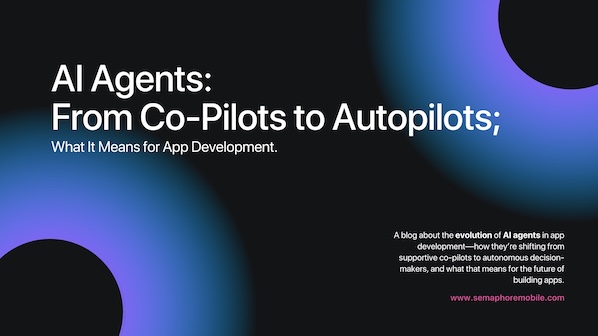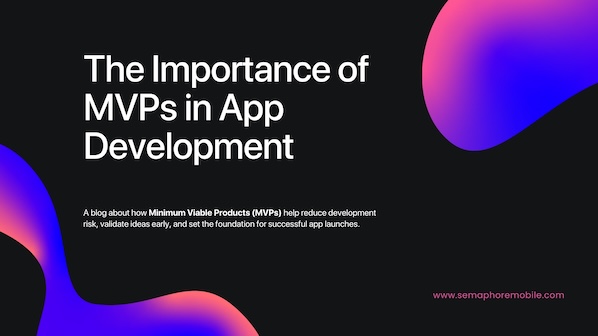
AI Agents in App Development: From Co-Pilots to Autopilots
Be it coding or designing assets, there’s no doubt that generative AI has had a surge in the technology over the last few years. It has evolved at an astonishing pace that, starting from an emerging trend, it has reached the level of being a fundamental aspect of contemporary software development. Some of these emerging models are GitHub, Copilot, and ChatGPT. This has transcended app development to a stage where developers don’t just code, they collaborate with these intelligent systems as a team.
And, there’s more to come. An AI agent will move from being a ‘supportive co-pilot’ to an ‘independent operation’, changing how applications are imagined, developed, and maintained.
For development visionaries like Semaphore, this is a pivotal moment. We are not just programming with the aid of AI; we are developing intelligent, adaptive, and progressively autonomous systems.
Defining AI Agents: The Next Step After Co-Pilots
What Are AI Co-Pilots?
Co-pilots are the first generation of smart assistants in the developer’s tools. Being extremely useful in boosting creativity, decreasing cognitive load, and raising productivity, tools like GitHub Copilot, ChatGPT, and other design assistants make code suggestions, find bugs, or produce content. Ultimately, co-pilots help automate tedious tasks. This is why they are called ‘co-pilots’. They rely on ongoing human direction, act within limitations, and wait for input.
What Are AI Autopilots (Autonomous Agents)?
AI Autopilots are different from co-pilots. They are AI agents like AutoGPT, BabyAGI, and Devin (the AI software engineer), who have advanced significantly and do more than assist and support. These, unlike co-pilots, are independent, self-governing, and can create plans and carry them out with little to no supervision. They can establish objectives, divide them up into smaller tasks, carry out actions, analyze results, and modify their behaviour as deemed fit.
How Autonomous AI Agents Are Changing the Game
From Task Support to Task Ownership
The best way to understand the direction we are heading is that AI agents will be able to help develop a feature, write tests for it, deploy it to staging, track its performance, and also be able to write a function. In short, AI agents will transition from ‘supporting developers’ to ‘owning tasks’.
One of the key advantages of this shift is the reduction of time developers spend on monotonous or high context switching tasks and enabling them to concentrate on strategy, creativity, and oversight, essentially, cognitive offloading.
Development Workflow Evolution
AI agents are redefining the workflow in its entirety. i.e, they are not only changing what is done, but also focus on the HOW. With the aid of AI agents, development processes start to resemble continuous orchestration instead of linear execution. Which means, code is tested in real time as it’s written, automatic integration of APIs, and fixing bugs and performance issues are a few. The change we see is a combination of autonomous planning, construction, and optimization.
Human-AI Collaboration Is Still Essential
So does this mean humans will be discarded in the process? It’s only natural to be worried when these developments are occurring. Where do the developers go?
Developers will shift from being builders to positions like architects, supervisors, and moral stewards. Yes, AI is good at patterns and repetition, but when it comes to abstract reasoning, emotional intelligence, and moral judgements, Humans will be needed. So no, AI won’t take your job.
The cooperation between the two is essential for successful implementation: humans will determine the course, while AI will speed up the process.
Key Benefits of AI Agents in App Development
Improved MVP Cycles and Round-the-Clock Performance
AI agents do not perform essential bodily functions like sleeping, eating, and resting. This cuts a considerable amount of time to market due to the ability to develop, test, and refine continuously. This is especially advantageous for startups that rush to produce competitive MVPs, beginning an always-on development model.
Better Debugging, Refactoring, and Testing
Quality is affected by several factors. Human fatigue, oversight, and similar issues are unavoidable when developing with human labor; however, tests and refactors don’t bore AI. Therefore, AI can assist in guaranteeing code quality, suggest optimizations, and identify edge cases.
Empowered Solo Founders and Lean Teams
With AI agents integrated into the workflow, they can accelerate key aspects of work. This benefits lean teams and solo founders primarily, as AI agents can greatly speed up production, especially in tasks like generating code, building interfaces, automating backend logic, and accelerating repetitive tasks. With a small workforce, startups can develop fully functional apps, front and backend integrated, which gives them a stronger competitive edge. These do need final polishing and human review, yet still considerably reduce time to market.
| Benefit | Impact |
|---|---|
| 24/7 productivity | Faster release cycles |
| Automated testing | Fewer bugs, stronger QA |
| Lean team enablement | Lower costs, greater agility |
| Scalable code generation | Consistent output at speed |
Applications & Examples
Autonomous Code Generation and Quality Assurance
Imagine an AI agent taking a Jira ticket, creating the feature code, testing it, committing to it, and initiating a pull request - all without direct human input. This is what AI will be able to do in the future: agents like Devin by Cognition Labs are already in the early-stage testing for this.
Implementation, Observation, and Upkeep
Some AI agents are strong allies in DevOps processes: they can react to uptime warnings or performance deteriorations, deploy code, and configure infrastructure. These are automated scripts enhanced with AI/ML, and they are able to respond to alerts. An example would be restarting services, scaling resources, or triggering notifications, and this typically happens in well-defined, rule-based contexts. Full autonomy in making complex decisions is still rare and often supervised.
AI Agents in Support and UX Flows
AI agents are personalizing onboarding paths, which changes their support from reactive to proactive. They also produce content and instantly resolve user issues from user onboarding to in-app guidance.
Challenges and Ethical Considerations
Reliability, Trust, and Risk Reduction
Reliability is one of the biggest challenges that we face when it comes to AI. Even the most intelligent agents can make mistakes, and these mistakes can be a result of misinterpreted specifications, hallucinated code, or misaligned objectives. That’s why people should and are involved in production, and it is crucial that they are.
Data compliance, security, and access
Deep system access is frequently necessary for an autonomous agent, but vulnerability accompanies access. So it is very important to make sure agents work within secure, auditable parameters, particularly in sectors that are subject to regulations.
Responsibility and Openness
Who is at fault if an agent deploys bug-ridden code - the agent or the developer who oversaw it? There should be clear lines of accountability, audit trails, and the ability to step in are necessary for the development of ethical AI.
The Future of Software Teams: Hybrid by Design
Project managers will orchestrate human-machine collaboration, developers will assign routine tasks to AI, and QA testers will transition from manual testing to AI validation oversight as we move toward AI-augmented development teams.
Soon, AI native products, apps created with agents in mind from the beginning, will become the new normal.
How Semaphore Is Preparing for the Autonomous AI Era
Including AI in the Toolchain of Semaphore
At Semaphore, we value efficiency, quality, and speed. That’s why we have integrated tools like ChatGPT, Copilot, and custom AI scripts in our development and design pipelines. This enables our teams to work more efficiently rather than laboriously.
Assisting Customers in Introducing AI-Native Applications
We don’t stop at just implementing AI. We are also assisting our clients in setting the standard. Semaphore is a co-pilot (and future autopilot) in this new era, helping with everything from developing autonomous features to creating full-stack solutions driven by generative AI.
Conclusion: Embracing App Development’s Autonomous Future
AI agents are changing the way apps are developed, tested, and maintained, from being passive assistants to strong, independent collaborators. In software development, the transition from co-pilots to autopilots is a turning point that offers early adopters unparalleled speed, scalability, and strategic advantage.
Teams can usher in a new era of hybrid, AI-native innovation by fusing the efficiency and scale of AI with the creativity and oversight of human developers. And for businesses like Semaphore, this is the cornerstone of the future, not just a fad.
FAQs About AI Agents in App Development
Can AI agents build an entire app on their own?
They can handle significant portions, but human supervision is still crucial, especially for creative direction, business logic, and error handling.
What’s the difference between AI co-pilots and autopilots?
Co-pilots assist; autopilots act. Co-pilots suggest code while autopilots plan, execute, and adapt without ongoing guidance.
Are AI agents reliable enough for production apps?
They’re improving fast, but most are best used in hybrid workflows for now. Reliability varies depending on complexity and oversight.
Will AI agents replace developers?
Not replace, augment. Developers will supervise, design, and innovate while agents handle the grunt work.
What industries are seeing the biggest AI agent adoption?
Tech, fintech, healthtech, and customer service are leading the charge with SaaS and DevOps seeing major boosts.
How can I start using AI agents in my own development process?
Start small: integrate a co-pilot, experiment with autonomous task bots, and evaluate where delegation brings ROI.
Contact Us
Our clients range in size from the large to the small. Let us know how we can help you. Drop us a line today and let’s start talking about your business.
What Are You Waiting For?
Copyright © 2021 Semaphore Mobile. All Rights Reserved.




Let us know your thoughts!